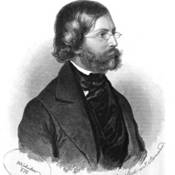
public domain
Salomon Hermann Mosenthal
Librettist
Biography
Salomon Hermann Mosenthal
Salomon Hermann Mosenthal was a prominent 19th-century Austrian librettist, playwright, and poet, best known for his contributions to German-language opera. Born on January 14, 1821, in Kassel, Germany, Mosenthal was of Jewish heritage and pursued studies in philosophy and literature before moving to Vienna in the 1840s. It was in Vienna—then a thriving hub of cultural activity—that Mosenthal established himself as a key figure in the literary and operatic scenes of Central Europe.
Mosenthal began his career as a dramatist, achieving early success with his stage play Deborah (1849), which dealt with Jewish identity, prejudice, and assimilation. The play was translated into multiple languages and adapted into the English version Leah, the Forsaken, becoming an international hit and earning Mosenthal lasting recognition as a socially conscious dramatist. His interest in exploring Jewish themes with empathy and complexity distinguished him from many of his contemporaries and reflected the broader cultural tensions of 19th-century Europe.
In the world of opera, Mosenthal made his most significant mark as the librettist for Die Königin von Saba (The Queen of Sheba), composed by Karl Goldmark and premiered in 1875. The libretto, filled with exoticism, biblical drama, and romantic intrigue, contributed to the opera’s success across European stages. Mosenthal’s rich poetic language and dramatic instincts helped elevate the work, and the opera became one of Goldmark’s most enduring pieces. Mosenthal also collaborated with composers such as Otto Nicolai and Friedrich von Flotow, bringing literary depth and emotional nuance to their musical works.
Mosenthal was admired for his versatility as a writer, with works ranging from historical dramas and poetry to critical essays and libretti. His literary style was marked by lyricism, a strong sense of structure, and an engagement with both classical themes and contemporary social issues. He remained active in Vienna’s cultural circles throughout his life, contributing to the intellectual and artistic vibrancy of the city during its golden age.
Salomon Hermann Mosenthal died in Vienna on February 17, 1877, leaving behind a legacy as one of the foremost librettists of his time. His ability to blend literary elegance with dramatic effectiveness made him a sought-after collaborator for major composers of the Romantic era. Today, he is remembered not only for his operatic work but also for his thoughtful engagement with Jewish identity and his broader contributions to 19th-century European literature and theatre.
Shows
Shows associated with Salomon Hermann Mosenthal
Songs
Songs from shows associated with Salomon Hermann Mosenthal
Videos
Videos associated with Salomon Hermann Mosenthal
Quizzes
Quizzes associated with Salomon Hermann Mosenthal
Additional Information
N/A